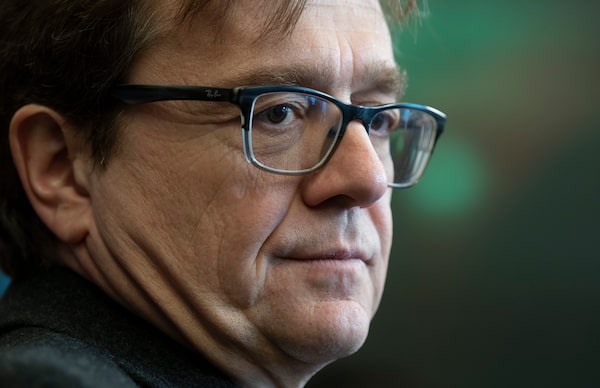
Environment Minister Jonathan Wilkinson, seen here on Jan. 30, 2020, said cabinet is set to decide on the project by the end of February, but added a decision could be delayed.Adrian Wyld/The Canadian Press
If you’re tired of the endless Canadian fight over pipelines, there’s some good news – that debate has been at least temporarily eclipsed as the proposal for the massive Frontier oil sands mine takes centre stage.
And one thing became clear in recent days – that the final federal decision on the Teck Resources Ltd. project is more likely going to come down to political wrangling between Alberta and Ottawa, rather than the conclusion of a joint-review panel that decided last year it was, over all, in the public interest.
Federal Environment Minister Jonathan Wilkinson signalled this when he suggested Alberta should lay down arms when it comes to its legal fight against the carbon tax as a trade-off for getting Ottawa’s approval for the oil sands mine – a project the province desperately wants to go ahead.
“The most recent actions are fighting federal government on the issue of the pricing of pollution,” Mr. Wilkinson said this week after being asked about the pressure from Alberta to make a decision on the Teck mine. The minister also said cabinet is set to decide on the project by the end of February, but added a decision could be delayed.
“What we’re looking for is concrete action on climate change.”
The results of October’s election proved many Canadians accept the Liberals’ commitment to get the country to net-zero greenhouse gas emissions by 2050, and want a strong carbon pricing system. Some think Alberta should be doing a lot more to reduce its emissions output.
But everyone should question whether specific project decisions should be made based on whether Ottawa and a province are getting along.
The framing of the question by Mr. Wilkinson gives Premier Jason Kenney ample room to argue that Ottawa is specifically targeting Alberta.
The province’s Environment Minister Jason Nixon said this week was the first he heard that approval of the Frontier project could be linked to Alberta’s legal challenge to the federal carbon tax. “All of a sudden, now, new rules come into the game?” Mr. Nixon said.
He added there is a carbon price for heavy emitters in the province, and Albertans are now paying consumer-level carbon taxes on items such as gasoline and natural gas.
This has taken place as the province grapples with an economic and employment slump that has gone on for five years. Workers from Red Deer to Fort McMurray see the Teck mine as one of the few spots for crawling out of the hole.
Mr. Nixon promises if the federal government delays or rejects the project, Alberta is not going to stay quiet. “We will fight tooth and nail for our province.”
Proponents of the oil sand mine argue it has a lot going in its favour: Unusually, there are agreements with all the Indigenous communities in the area. There’s a promise to be best-in-class when it comes to GHG emissions for each barrel. It will create thousands of jobs and tens of billions of dollars in tax revenues.
But there remain major concerns about the huge swath of land the 260,000-barrels of oil a day mine will chew up, the impact on caribou and bison populations, and the 4.1 million tonnes of CO2 equivalent operations will produce each year.
The federal approval isn’t the only question about the project – there are economic challenges, too. As Teck chief executive Don Lindsay told a Banff business audience this week, the company also needs pipeline capacity, high-enough oil prices and a business partner to share the risk and rewards of the $20.6-billion project. It’s a daunting list.
However, Doug Brown, director of public affairs at Teck, said Friday the company has spent more than a decade working on the project and it’s wrong to interpret Mr. Lindsay’s comments in Banff as a signal that Teck is not as committed to the project, or oil sands plays, as it once was.
The main hurdle, Mr. Brown said, is a federal decision, and the conditions attached. “It’s met every single test. If not this project, then what project?” he added.
When it comes to investment in major projects, there’s an increasing lack of trust from the business community that Canadian regulators and governments can provide certain, predictable decisions. For Alberta, and any other province interested in developing big resource projects, this is the crux of the problem – no one knows exactly how the Liberal plan to get to net-zero emissions will play out.
Right now, for instance, there’s quiet kvetching in Calgary about Mr. Wilkinson’s December approval for exploration offshore drilling in the Flemish Pass Basin off the east coast. The approval was granted to the China National Offshore Oil Corp. (CNOOC) – a massive offshore producer owned by the Chinese government.
The environmental considerations of an offshore exploration project aren’t the same as an oil sands mine. But still, it’s been hard for some to avoid looking wistfully at the environmental approval process that lasted less than three years.
“The Alberta government supports responsible development of Canada’s oil and gas industry, including elsewhere in Canada. We don’t believe in pitting province against province,” Alberta’s Energy Minister Sonya Savage said.
“At the same time, it would be troubling and contradictory if Ottawa was to reject the Teck Frontier mine – a ready-to-go project with the support of all 14 First Nation groups in the region – while approving new offshore drilling on the east coast.”
 Kelly Cryderman
Kelly Cryderman